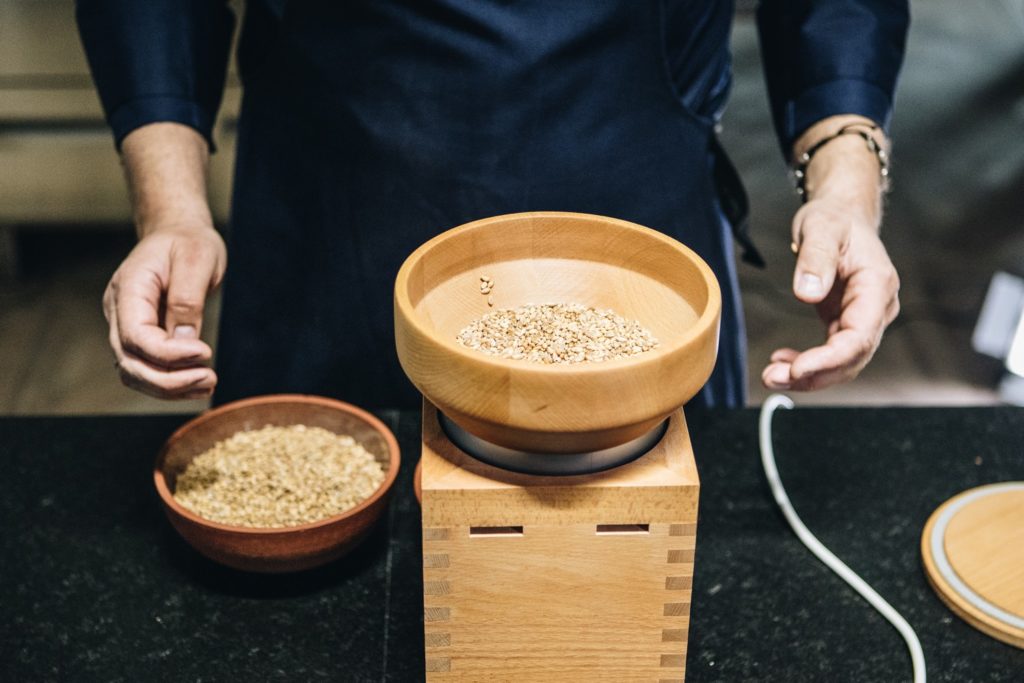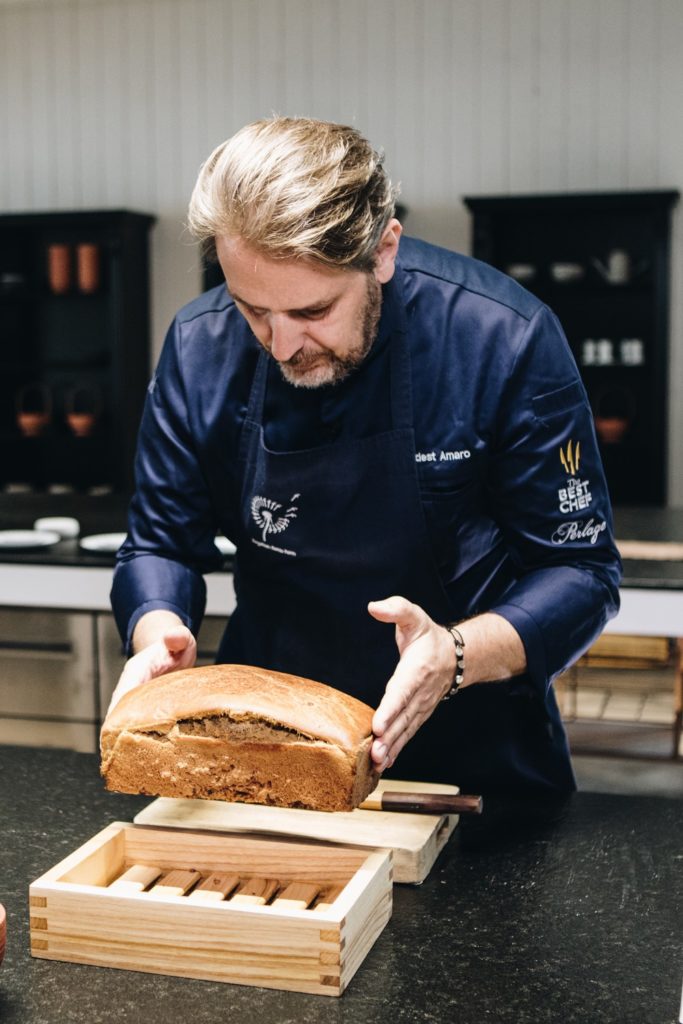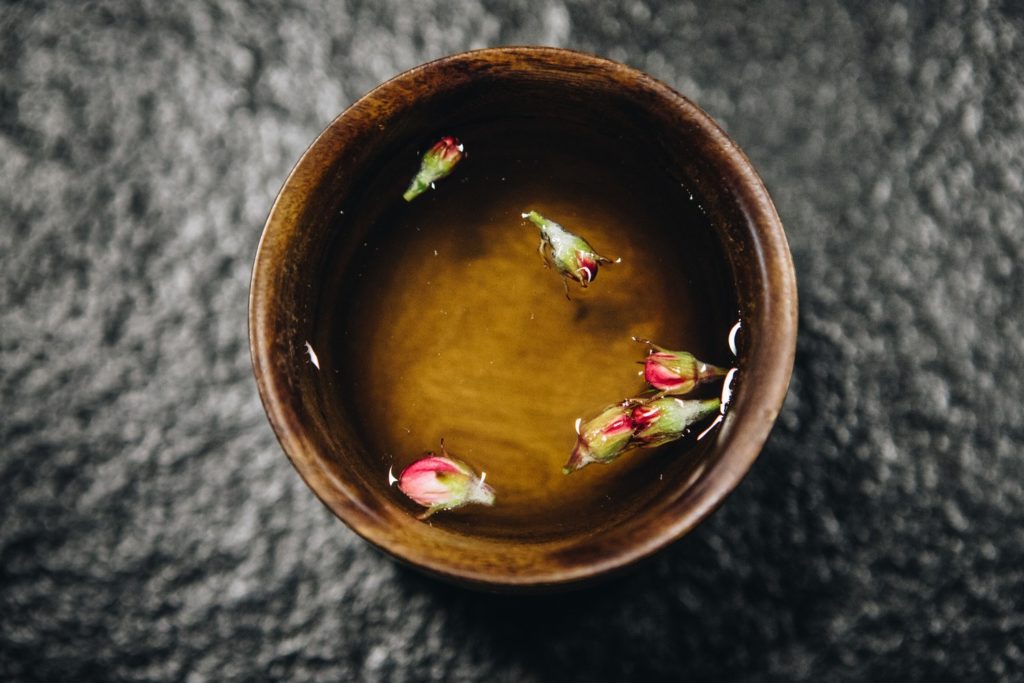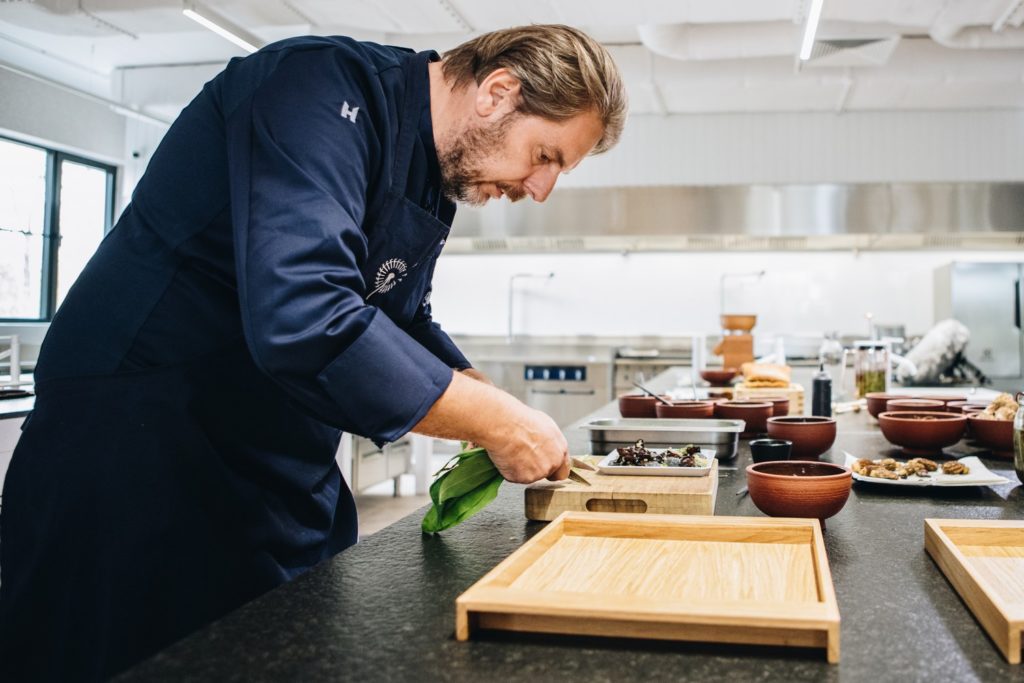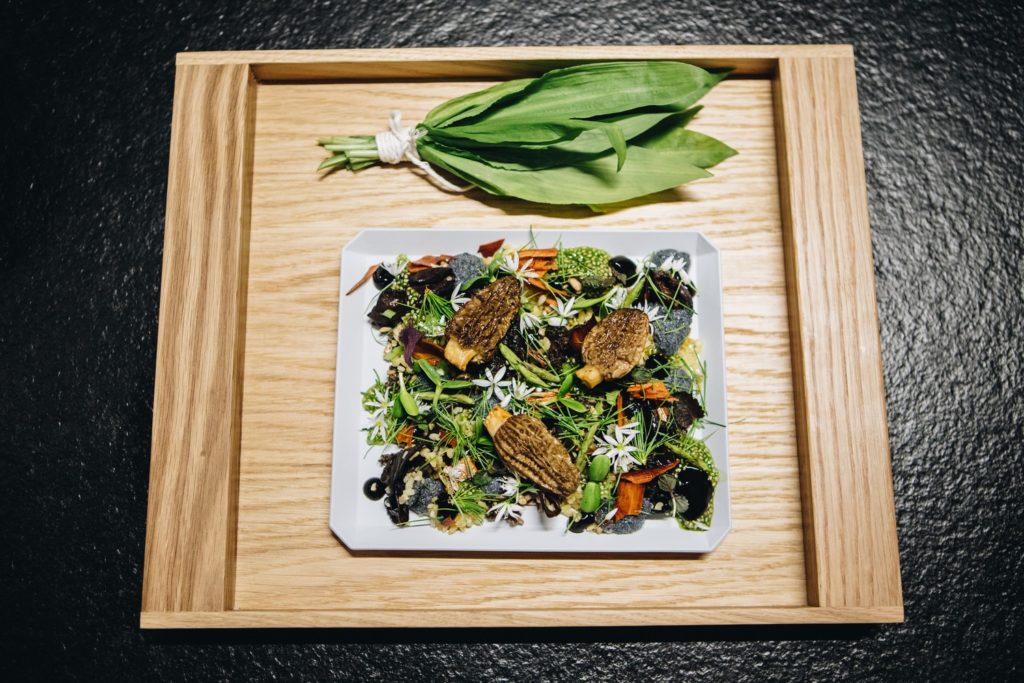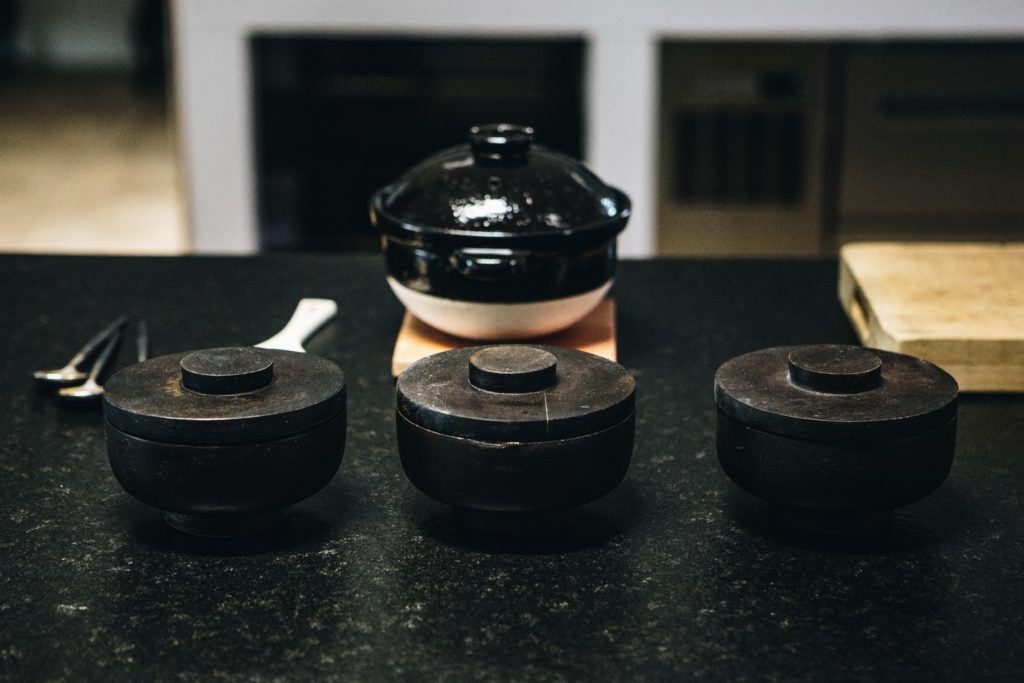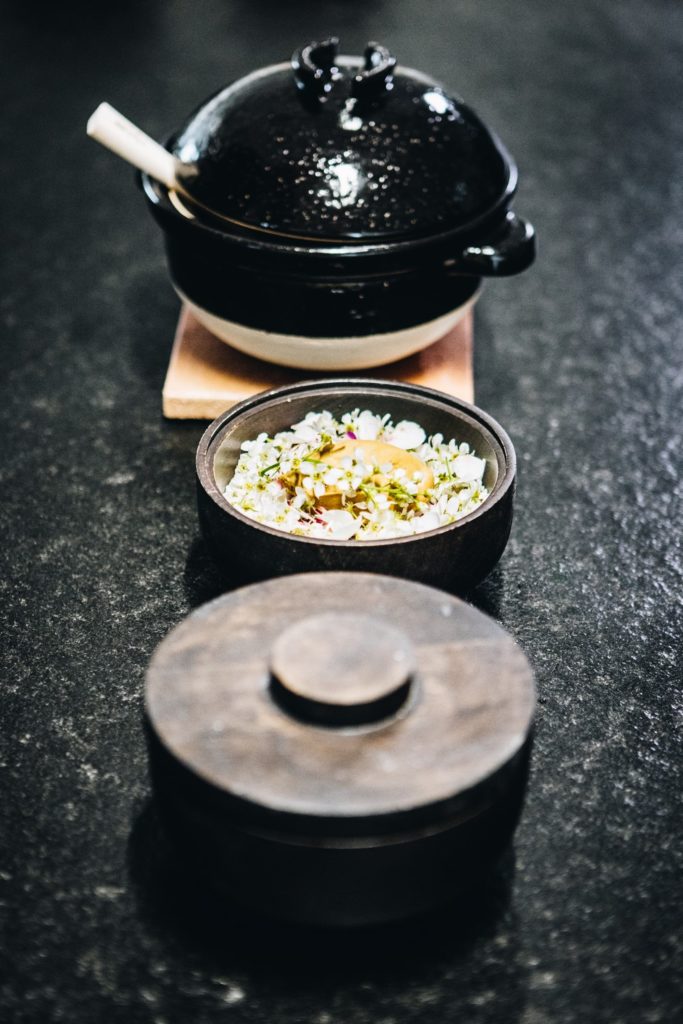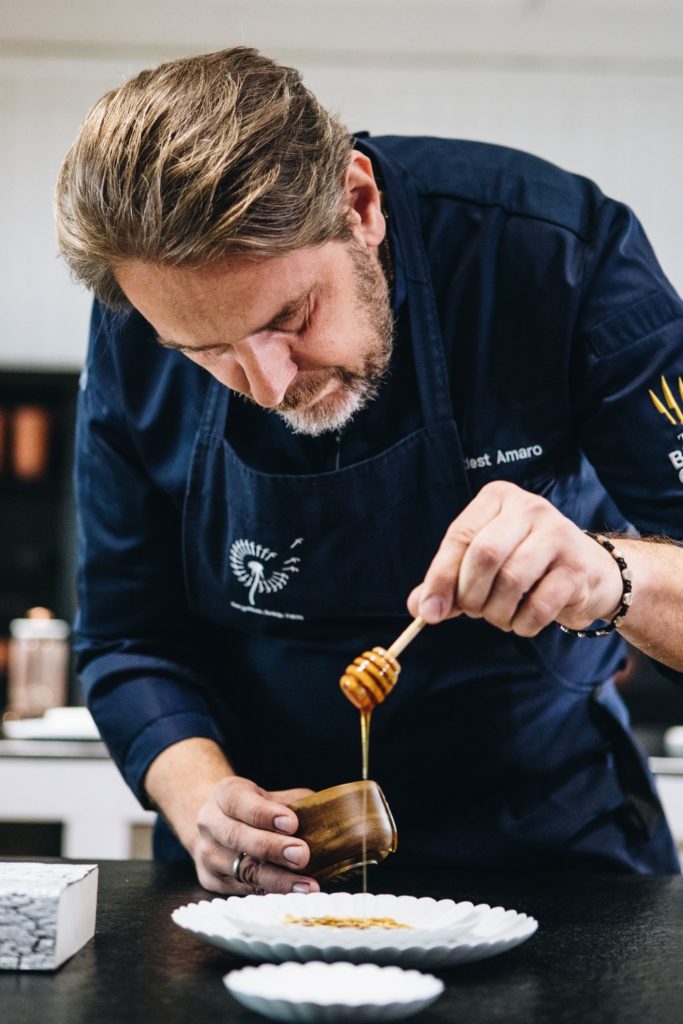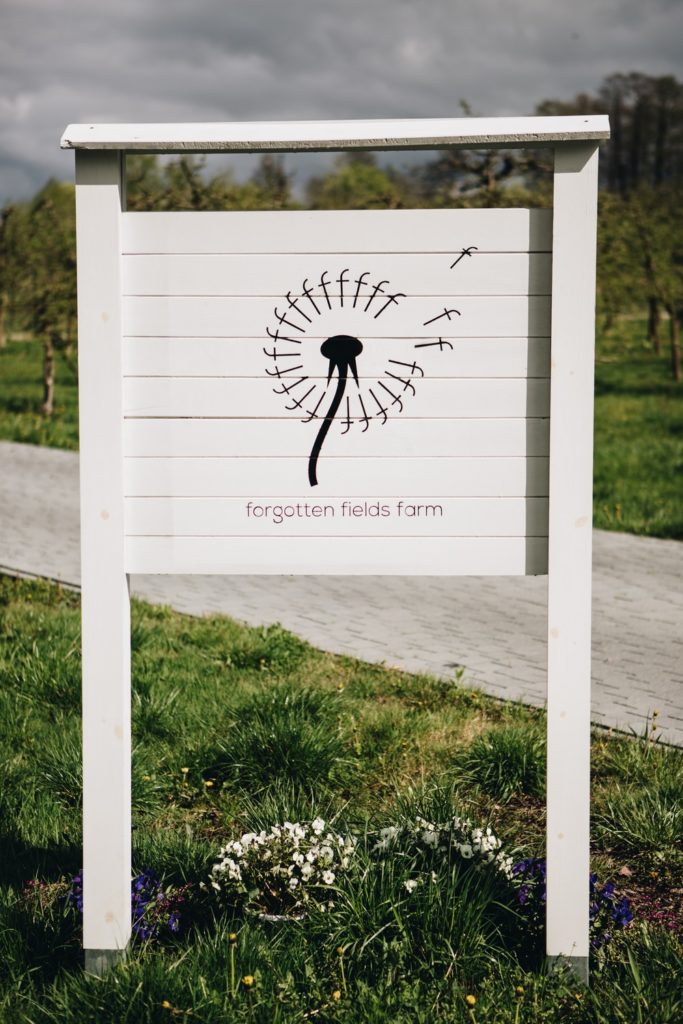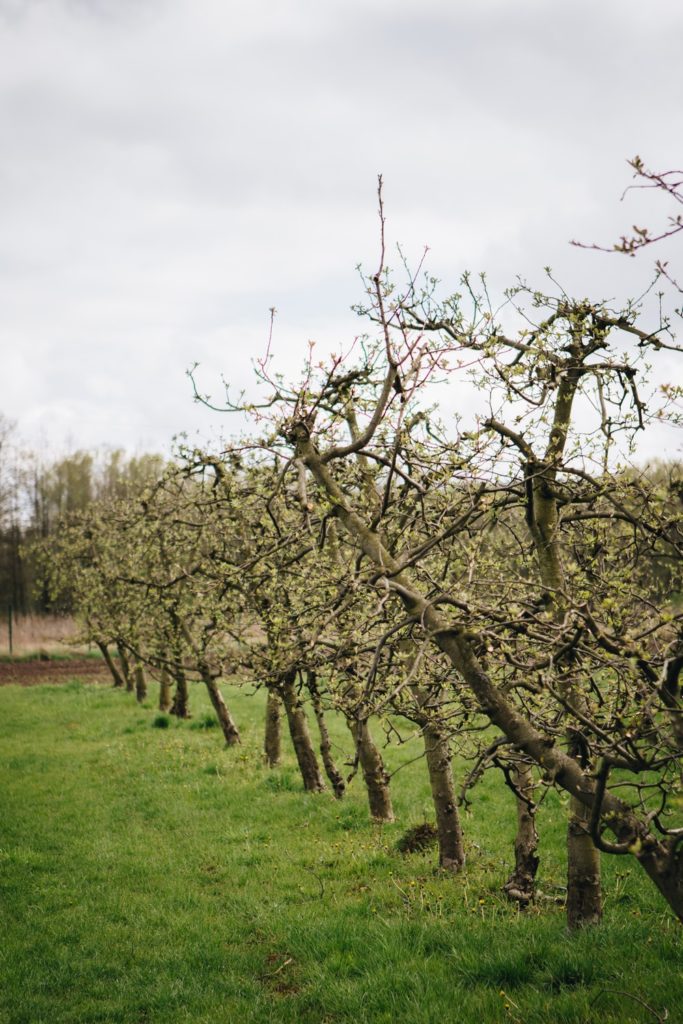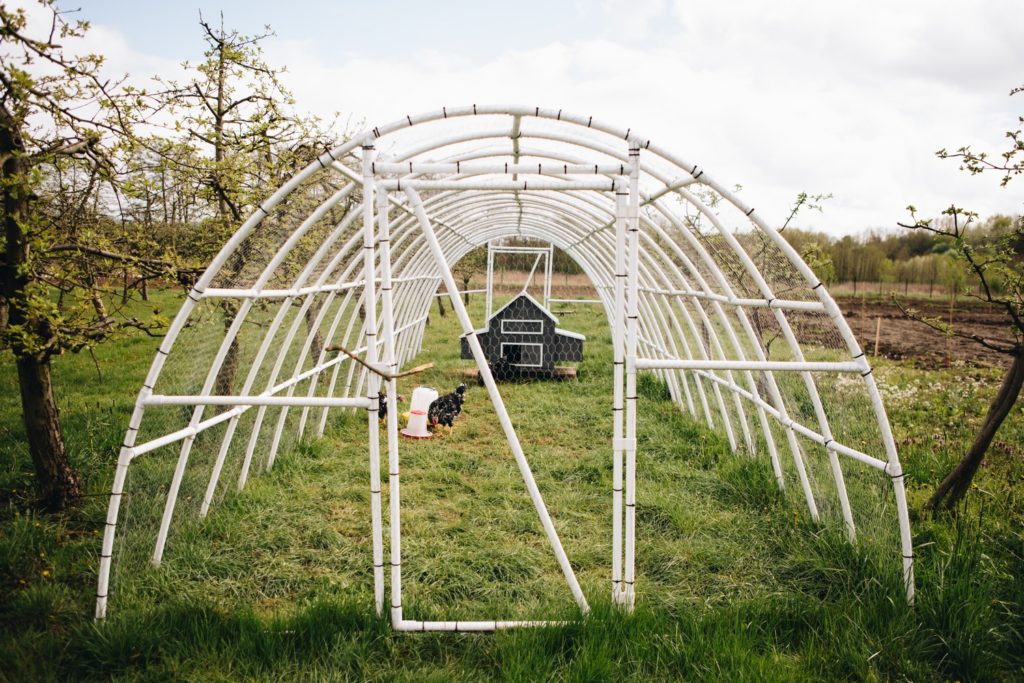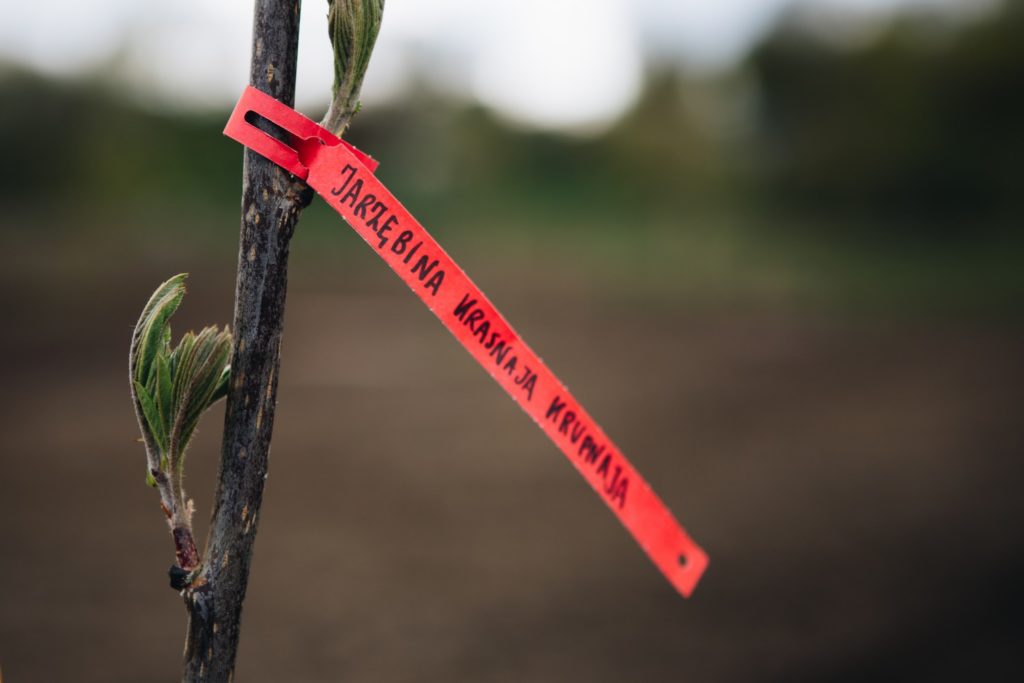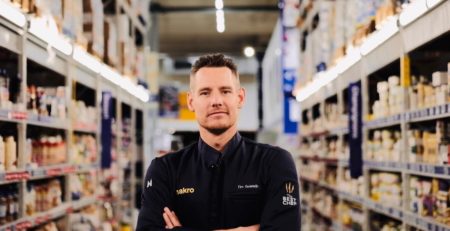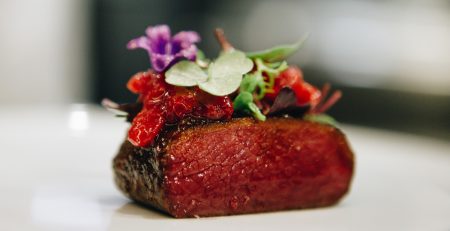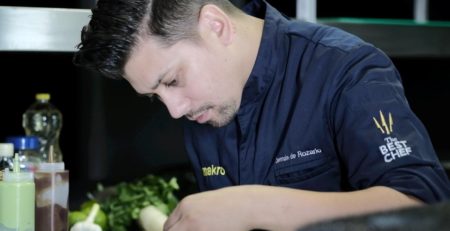Wojciech Modest Amaro – chef and owner of Atelier Amaro, the first Michelin-starred restaurant in Poland, founder of Forgotten Fields Farm and the Nowe Życie Polska Foundation, author of the Heart by Amaro concept – Amaro bistro in Zakopane. Culinary juror and critic, former host of the program Hell’s Kitchen. Unquestionable culinary authority.
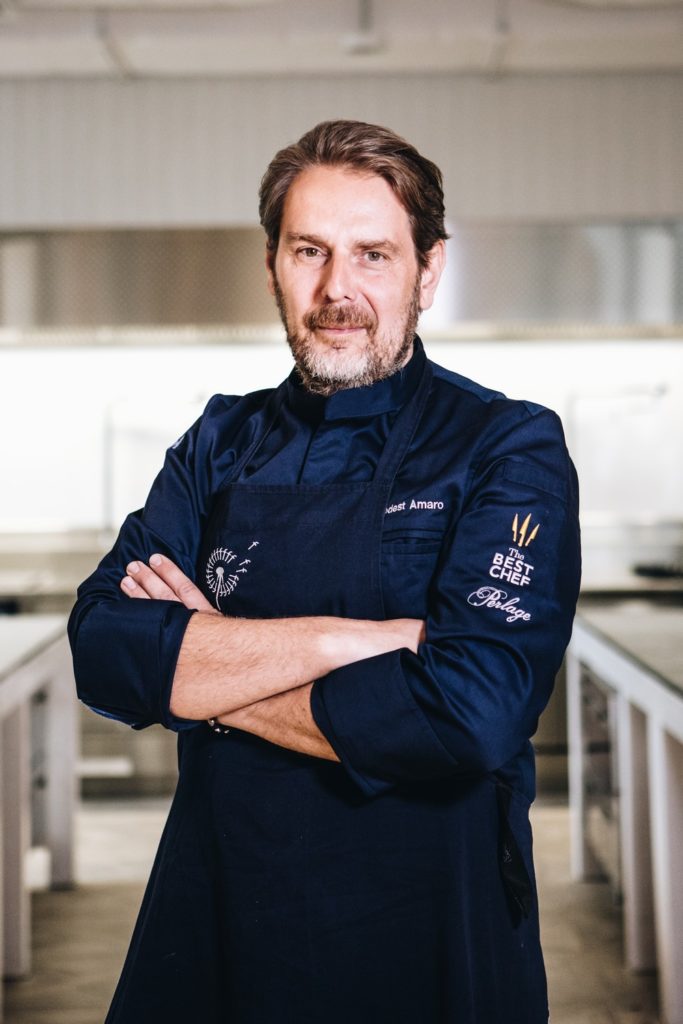
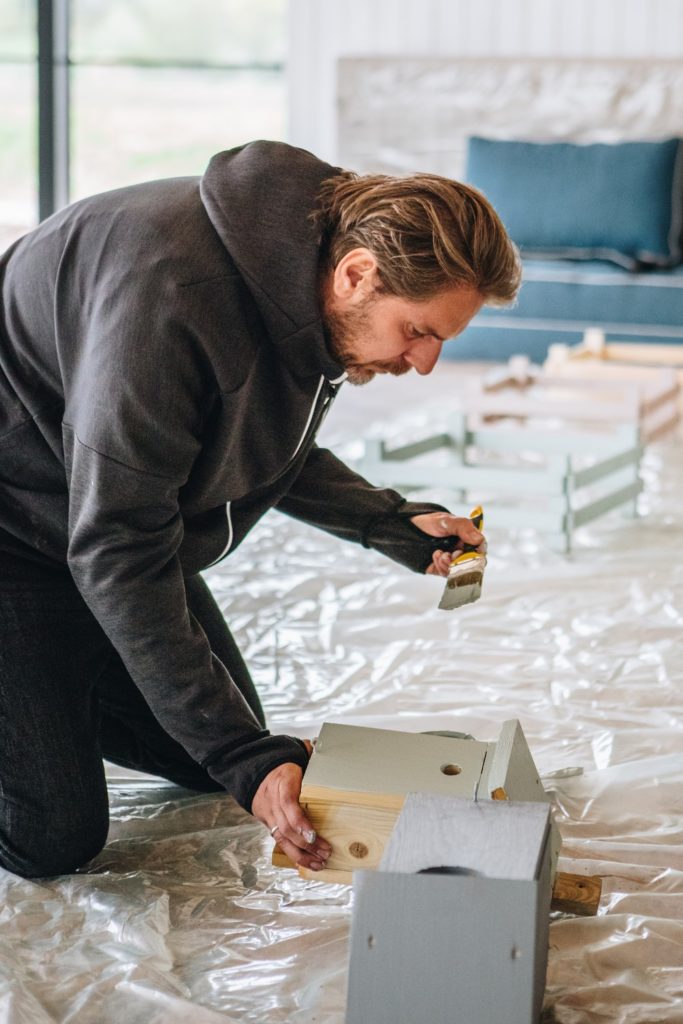
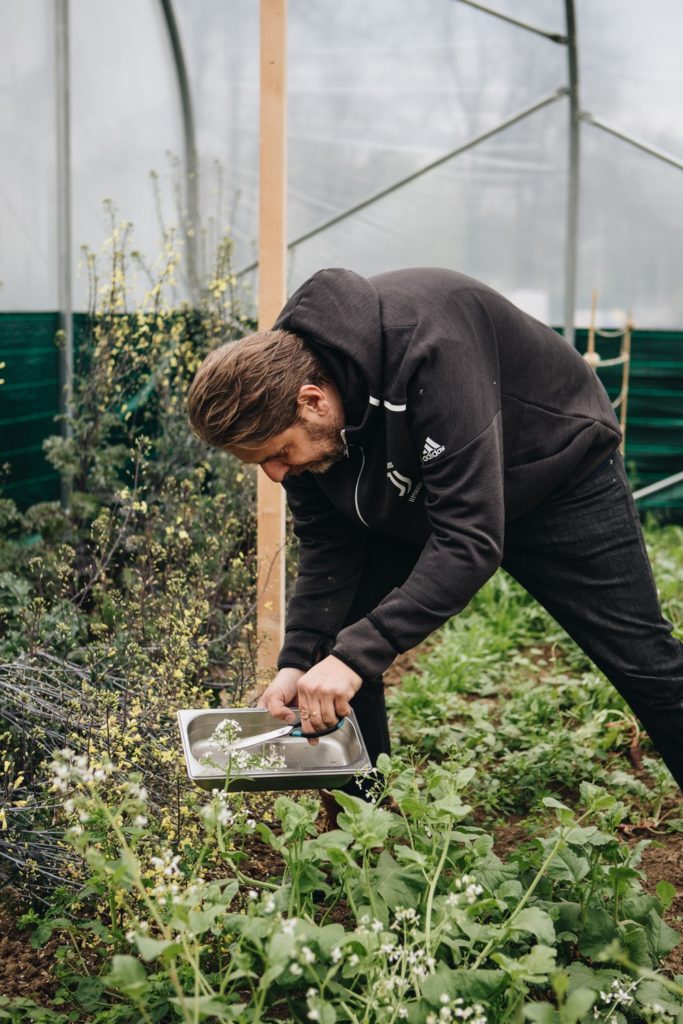
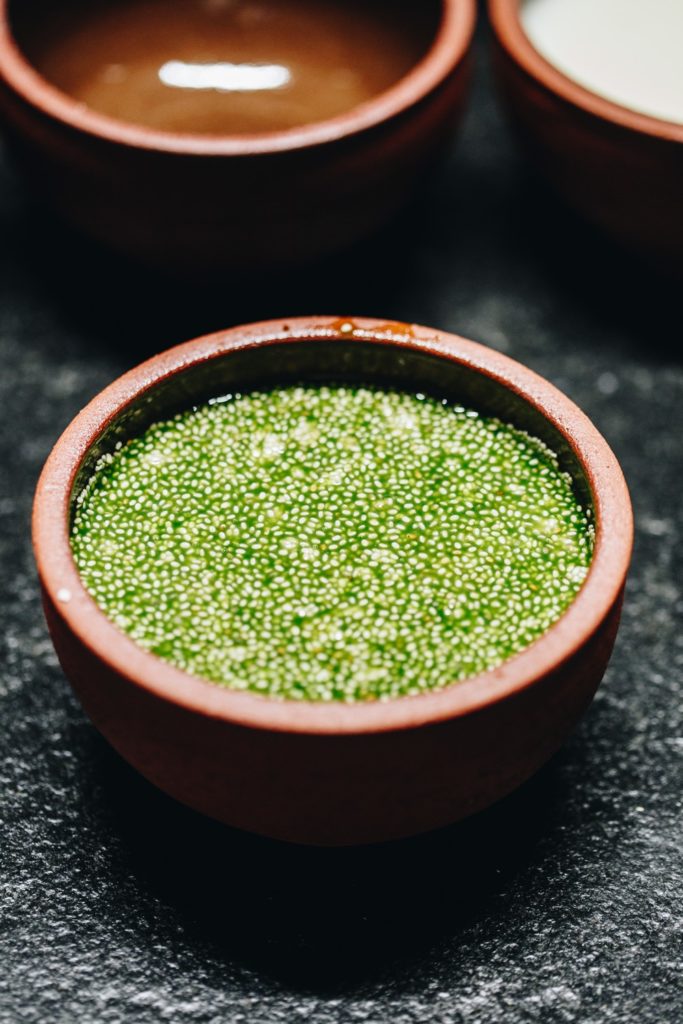
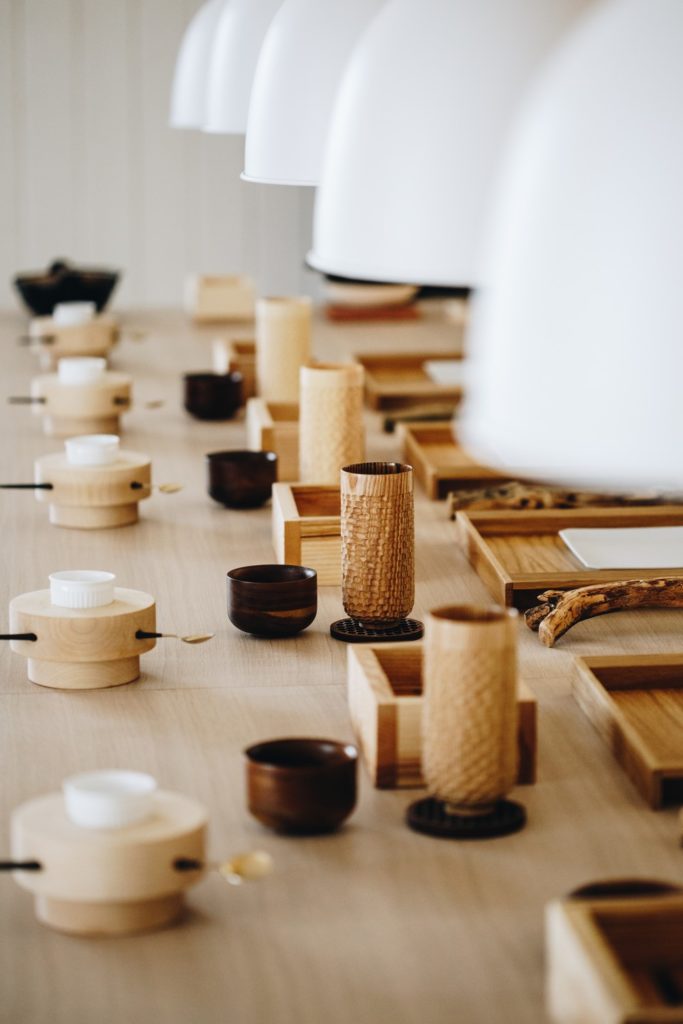
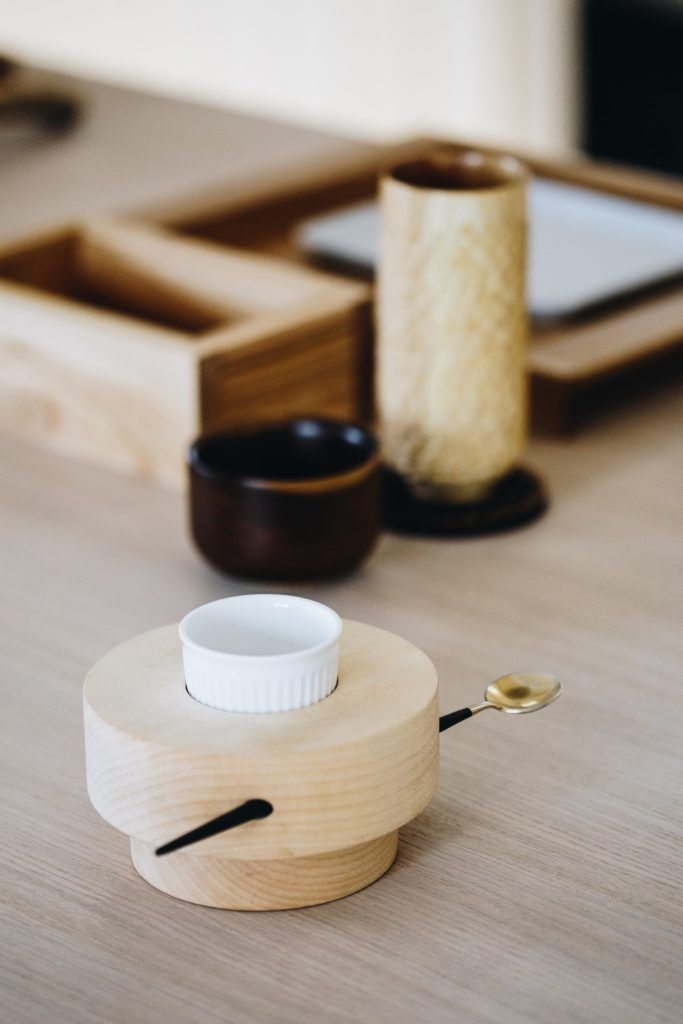
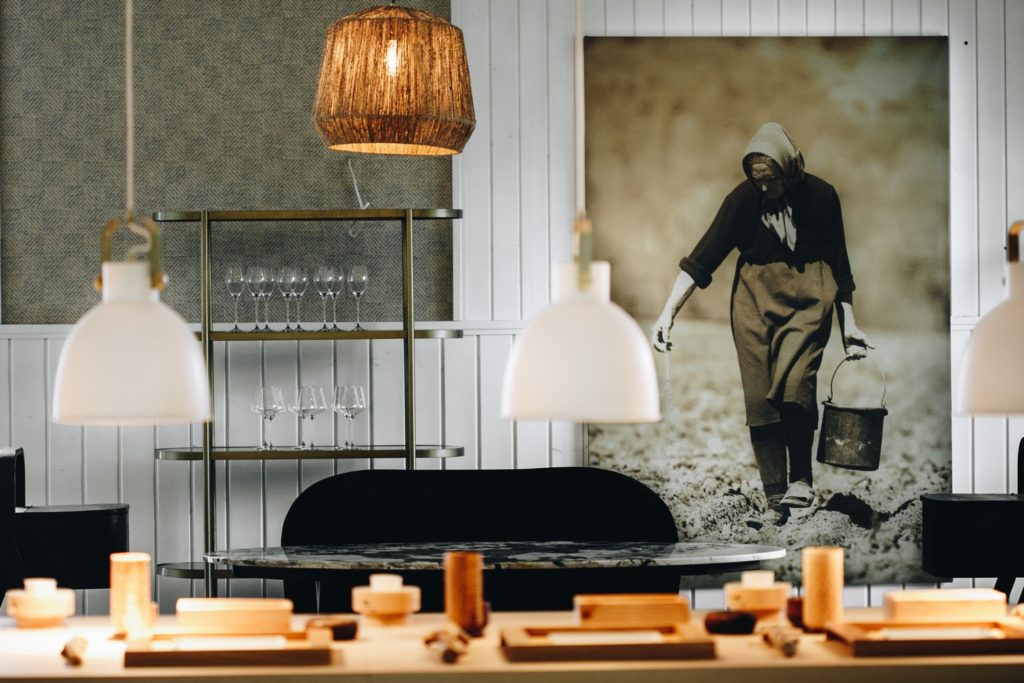
The Best Chef: How did your cooking adventure begin?
Wojciech Modest Amaro: The kitchen has always been the most interesting place in my house that I have visited. There was always something going on there, it was full of dynamics, aromas, products, things full of flavour, and that was what attracted me, I liked standing there, I liked helping and serving. I also think that an important role in my education was contact with nature, which we had as siblings, with my brother and sister. Every year during our holidays, we went to visit our family in Greater Poland in the countryside and we spent two months there, so that is enough time to get to know nature and its richness. These are the moments, when it seems to me, the original flavours were saved in my flavour memory, I very often refer to them, because in the times of heavily processed food, not all generations have a chance to try something straight from the ground, just washed. I had such a possibility and it seems to me that it is always a reference point for me, that I find myself there, there is something about that flavour and my thoughts, my memory, my flavour memory, go back to that time. So these were my beginnings, it is then that I decided about my future, after elementary school I wanted to go to secondary culinary school, which was not very warmly received at home, but it must be said that in those ancient times, secondary culinary schools were treated more as an exile, and my parents did not quite like this idea. So I ended up completely elsewhere, in electronic secondary school, so as not to waste my talent, I don’t know what talent, because I did not find myself in this profession or in this course, but I do not regret anything. After graduating from the secondary school, I went to London with a clear head and there, of course, I wanted to start working in the kitchen, and finally I found myself in the kitchen, which was a joy in itself for me, because I was waiting for this moment.
The Best Chef: You are an icon of Polish cuisine, the first chef to receive a Michelin star, did you feel overwhelmed by it?
Wojciech Modest Amaro: Never, because I wanted it, I wanted to change Poland. I travelled the length and breadth of Poland, for 12 months, 60 thousand kilometres, I visited places I never knew before, we can say I wanted to write a symphony, but I had no notes. So I went to see if there were any notes I could create from, or is it just a patriotic beating in my chest, no, Polish is the best, but in reality it entails nothing, there is no depth, there is no discernment, knowledge of places, products, traditions. So I decided to do my homework first and went on a journey, and there I got enlightened that such places exist, such products exist, that Poland, whatever we say about it, has its specificity, where especially awakened after the communist era, we still had over one and a half million small farms, which means they cultivated, they knew what to do, how to cultivate those home gardens I remembered from my childhood, they were everywhere, so the advantage of the lack of such industrial cultivation also helped us retain a lot of places in their natural state. 30% of Poland’s area is covered by forests, there are more than 7,000 lakes clustered together in one corner of Poland, so all that, mountains, access to the sea, the diversity in Poland is ideal and you can source something from any of these regions. I created a calendar of nature, I divided the natural environment into these natural areas as they occur. While browsing through my notes, analysing my thoughts, I realized that as chefs we ask suppliers all the time what they have, and what is available, these questions arise all the time, so we don’t close our eyes and it’s not automatic that on March 1 asparagus shows up, because sometimes it shows up, and sometimes it doesn’t, and sometimes it shows up two months later, so the calendar of nature, natural journey following a product in the 52-week rhythm, in narrow sections of time has become something natural for me, I respect them obviously, it is a part of tradition and the global division into four seasons, while from a culinary point of view, a week-after-week journey is more precise, sniffing the ground, I would say, and then we actually feel what nature offers at a given moment, like spouts in spring, such a season lasts two, three weeks, and then everything keeps growing, hardening, changing its structure, hence is not easy to use any longer.
In the first week of the functioning of the calendar of nature, we wrote down, I don’t remember exactly, but about 537, 534 ingredients, so if we have a big table, let’s try to place such products on it… if in our head we have a tomato, a cucumber, a beetroot or something, a single product, suddenly it turned out that with the first attempt, dividing the natural environment into areas, one hundred of this, fifty of that, a hundred of this, and we have heaps of products, so for someone who is involved with a creative approach to cooking, it is an ideal tool for creativity, because I can sit, wheel and deal, mingle flavours, add and taste whether they work together.
And then I thought to myself, that it is worth letting people know about it, through my own channels, I reached out to people, to chefs and I tried to talk about this cuisine. I think that this star was a very helpful tool in this, because the very fact that I received this star was publicized by CNN and many other stations, by which I was interviewed. It was a great event even though stars are given quite a lot in other countries, but in Poland it was the first one, exceptional, historical, so it caused a big fuss and it was amazing.
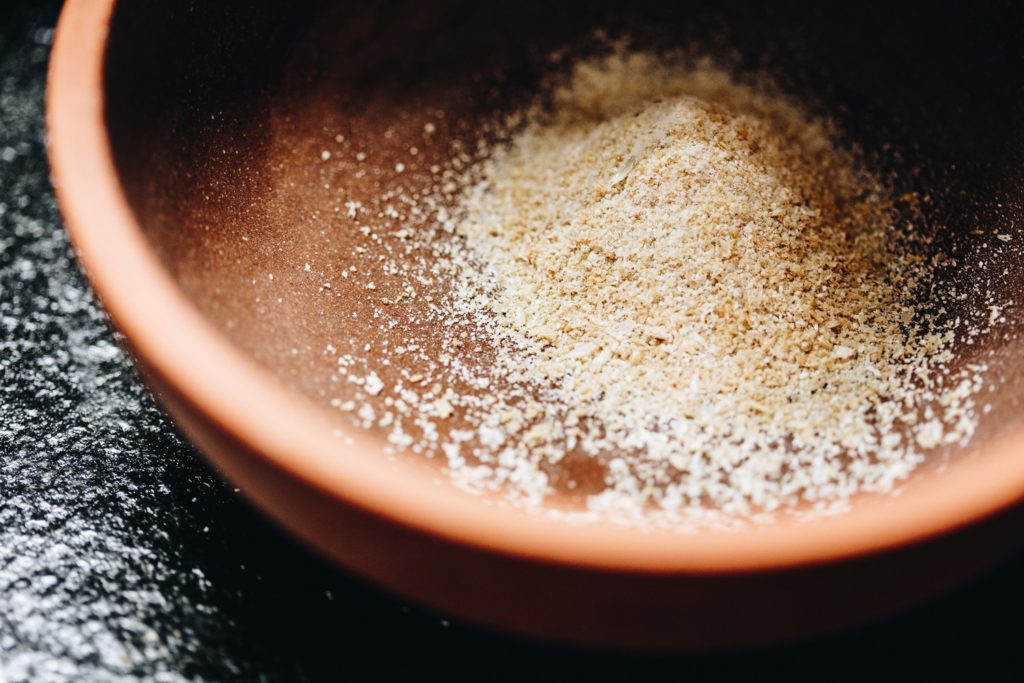
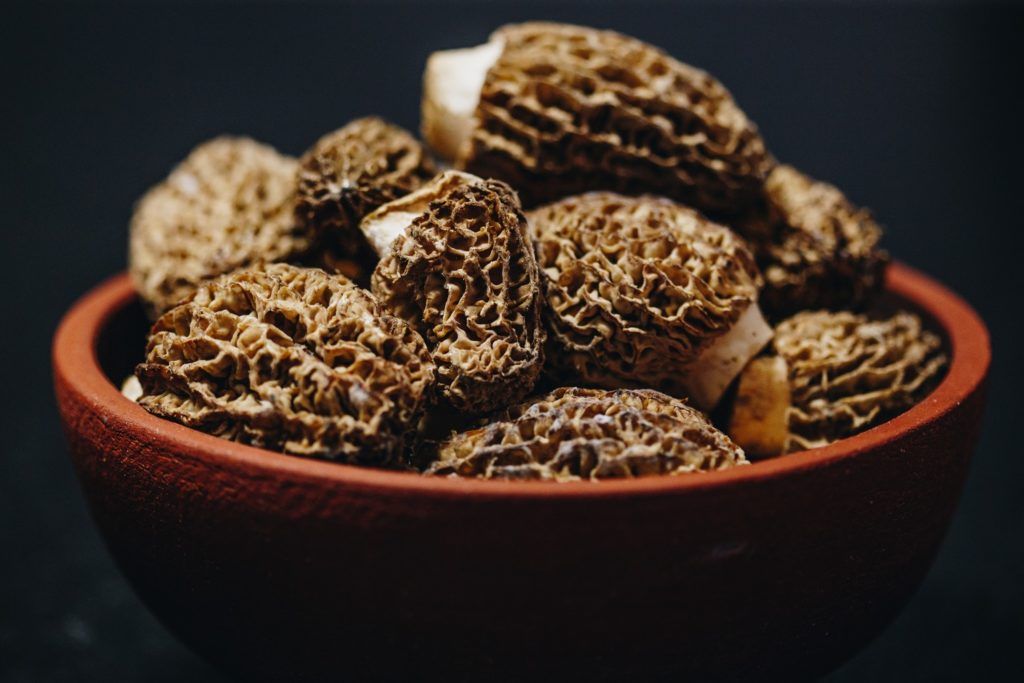
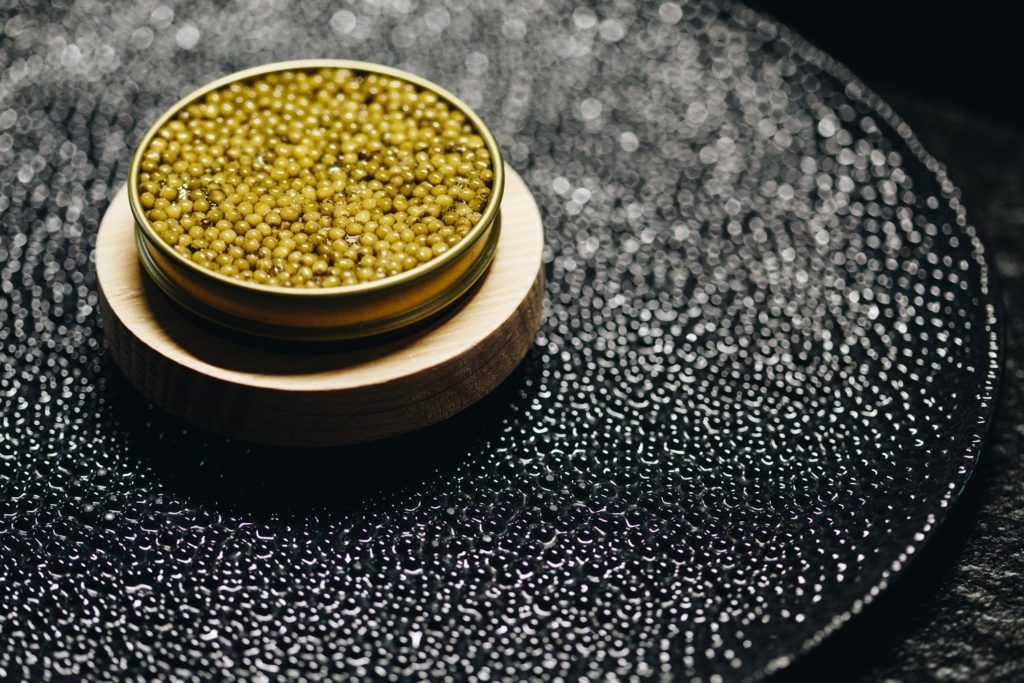
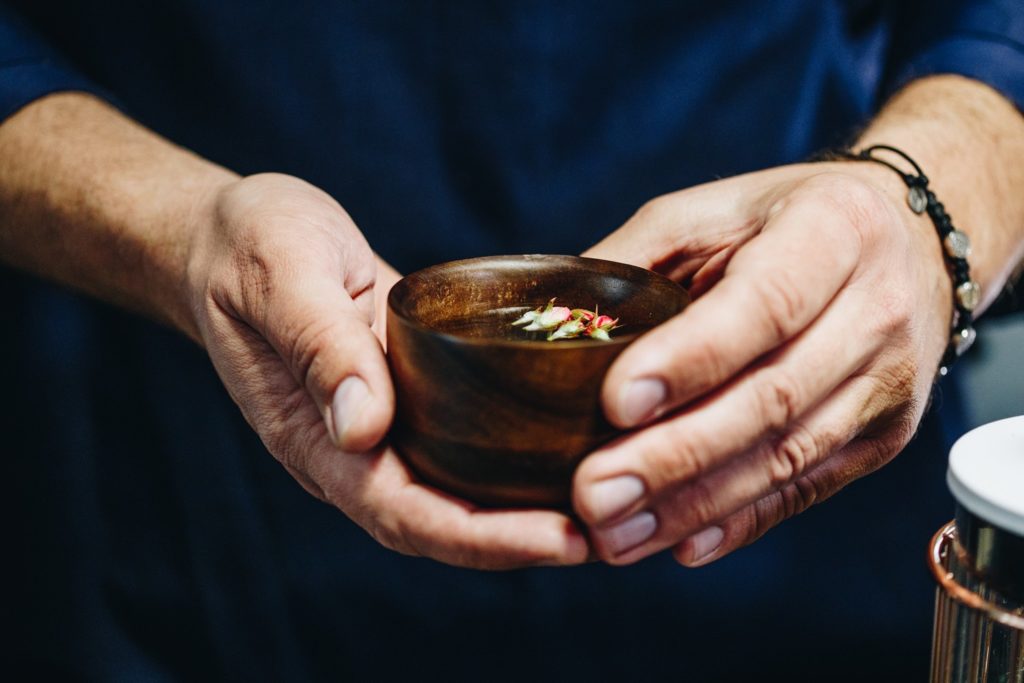
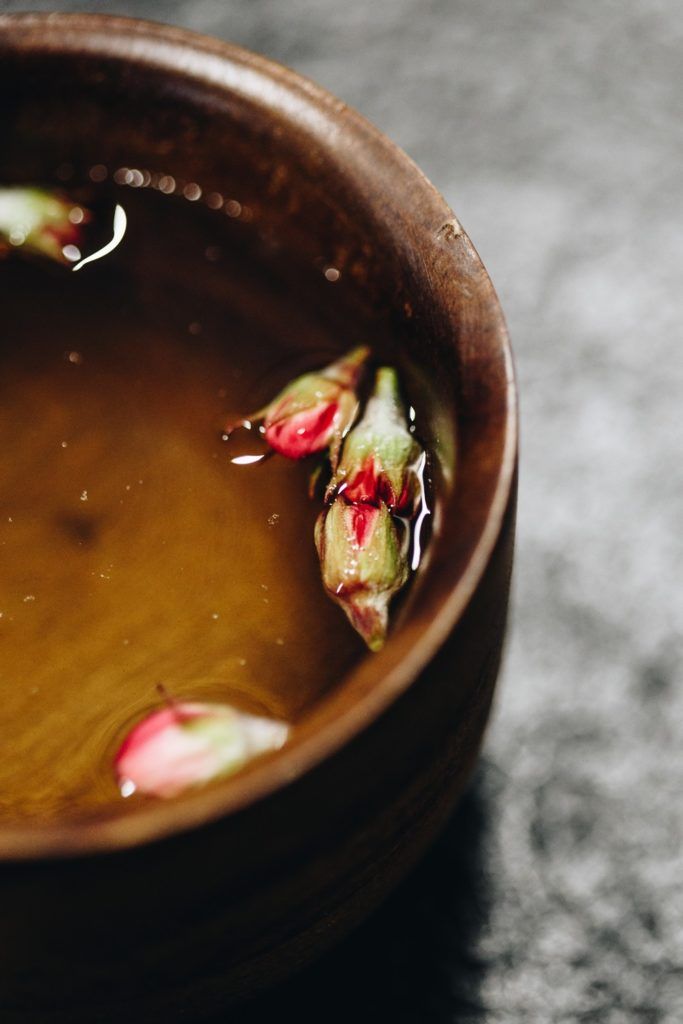
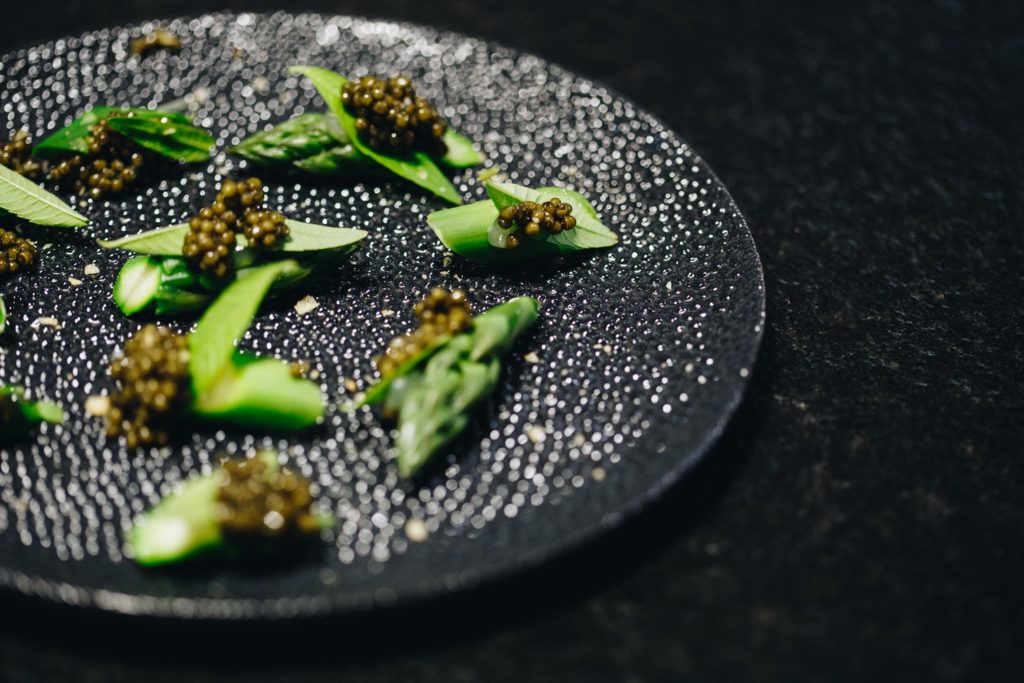

The Best Chef: What changed when you received your Michelin star?
Wojciech Modest Amaro: I got involved in television, I didn’t see myself in this role, but I thought that it is worth teaching young chefs practical knowledge, giving them hints, instilling faith in Polish products, so that they approach them with passion and a sparkle in their eye. The moment we became the embassy of Polish cuisine, we started receiving dozens of CVs for internships. 800 people passed through the door of Atelier’s kitchen and they took a handful of what we developed and went to different regions in Poland. A lot of chefs operating in Poland were in touch with me and I think this is something to be proud of. It is always something good to see that someone has grown on the basis of everything we’ve done there. What we have put on plates is only one tenth of what we have worked through at Atelier for our own knowledge. We have refrigerators packed with experimental dishes that the world has never seen, and for me, this pursuit of this search for something cool was the main part of Atelier. That is why the name – Atelier – a studio, we are figuring out, destroying, we like herding cats to find something interesting, to find some connections and we have never been afraid of it. With the young people who came to me, the first thing was to break with habits, breaking with restrictions that something is not allowed, everything is allowed, just give it culinary logic, I call it that, then everything can be done, when we start to get more or less what it is all about.
The Best Chef: You moved from downtown Warsaw to the nature centre, why?
Wojciech Modest Amaro: A dream planted deep in your heart, grows and if you have the courage and consistency you will make it happen. I knew it would happen, I love nature so much and being fully aware and despite the fact that I am a mature guy, I would like to learn something more than what happens from the moment a box lands at the doorstep of my kitchen and there are certain products there…I made up my shortcomings because we travelled and collected products from the wild ourselves, but there are still a few things to develop. The first thing for me was biodiversity, this narrow range, which the unification of the whole world simply deleted completely, it’s dramatic, so even when I have the best suppliers and today we have such an eco-friendly trend, it does not quite suit me. My point is not that a potato is organic, only organic, it is not only about that, but that there are ten varieties I can choose from. Because today, if we are to have two organic apples, thanks, but no thanks, because a hundred years ago we had 600 varieties, still 50 years ago we had 200 varieties, and today it is different, this unification has destroyed a lot, the market is not brave enough to go back, as it calculates everything in an obvious way, so maybe it is possible to revive it all differently, maybe it can be attempted differently, and as I started writing down on a piece of paper what is available for me to buy, products, according to what criteria they occur, it turned out that the first one is obviously financial, the second is shelf-life, the third – ease to cultivate, the fourth – repeatability, the fifth – productivity, the sixth something or other, and the seventh turned out to be flavour. I am shocked, I am devastated that this is my profession. Flavour takes seventh position, so I wanted to turn this ladder over completely so that flavour came first. If we have three kilos from a bush here, tough, the branches do not have to bend and carry a hundred kilos of something, we want to know, we want to cognitively following the calendar of nature, prepare dinner. In the old Atelier at Grikola once a month I made dinner “from the sea to the Tatra Mountains”, we got a handful of products and that is why these dinners were so special, because something was brought to us and we only served it once, for the 28 lucky ones who got there and these products were served only once, unique and I think that following this key, primarily educationally, we will learn a lot more. It is not just that the apple has to be great, beautiful, juicy, turgent, maybe the best cider can be made of the small ones that nobody wants, or something else, and it is this use, this knowledge that we lack, I would like, and it is not a utopia, that it would not be some apocalyptic story, that we can revive it someday. If we’re ever going to revive it we have to do it now.
Hence the Forgotten Fields Farm, because they are forgotten varieties, forgotten plants, forgotten species, on some tiny scale there is at least such a desire in me to try. When I fail, it is fine, because I know that I tried, but if I did not move and try something that is pulling at my heart, then this idea does not make sense, so I am one of those who even take failing into account, but still believe it is worth trying, worth fighting for, and how much we will be able to achieve? We will see, time will tell, but the willingness is huge.
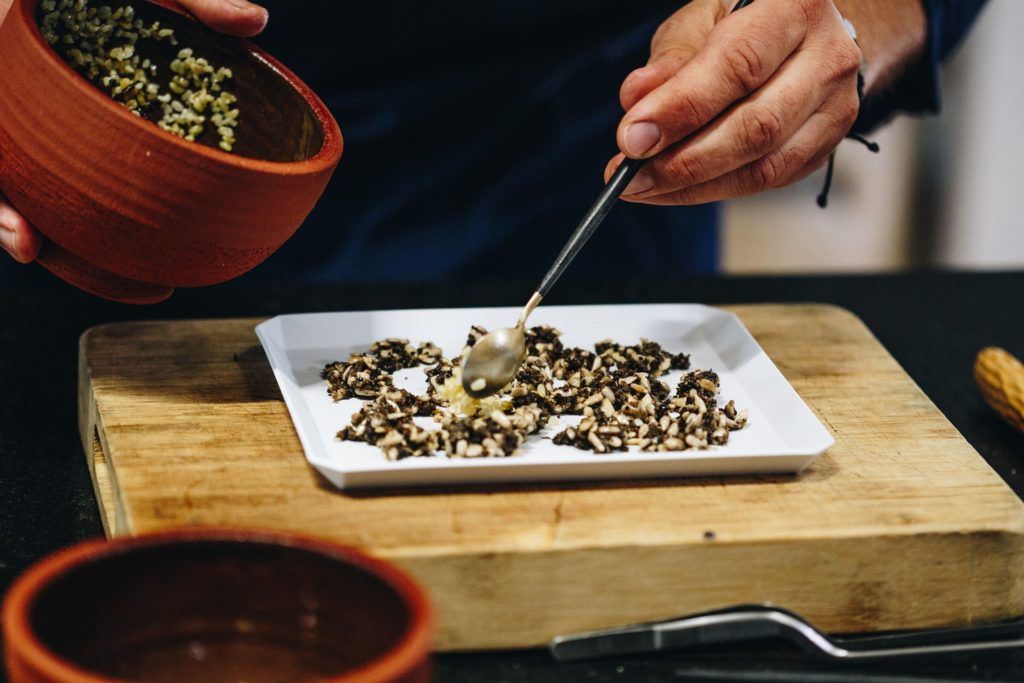
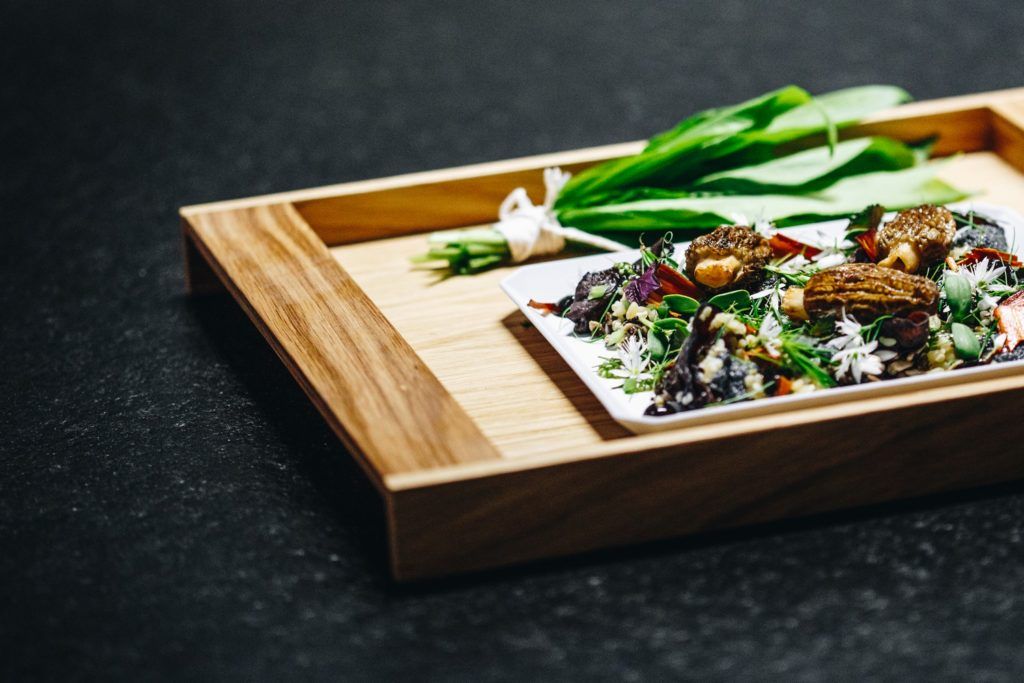
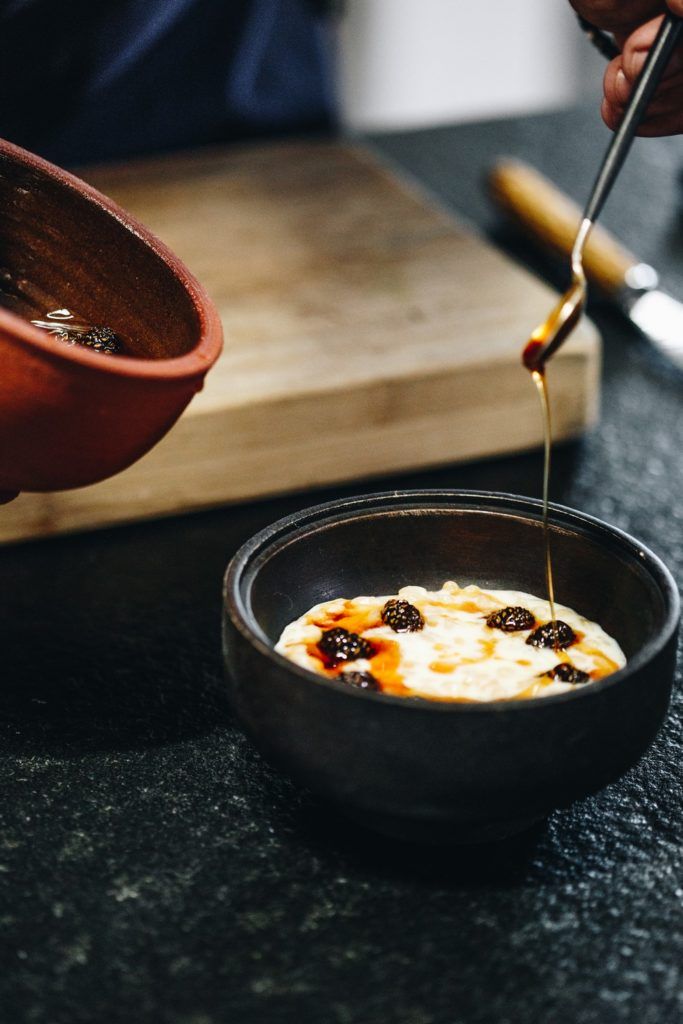
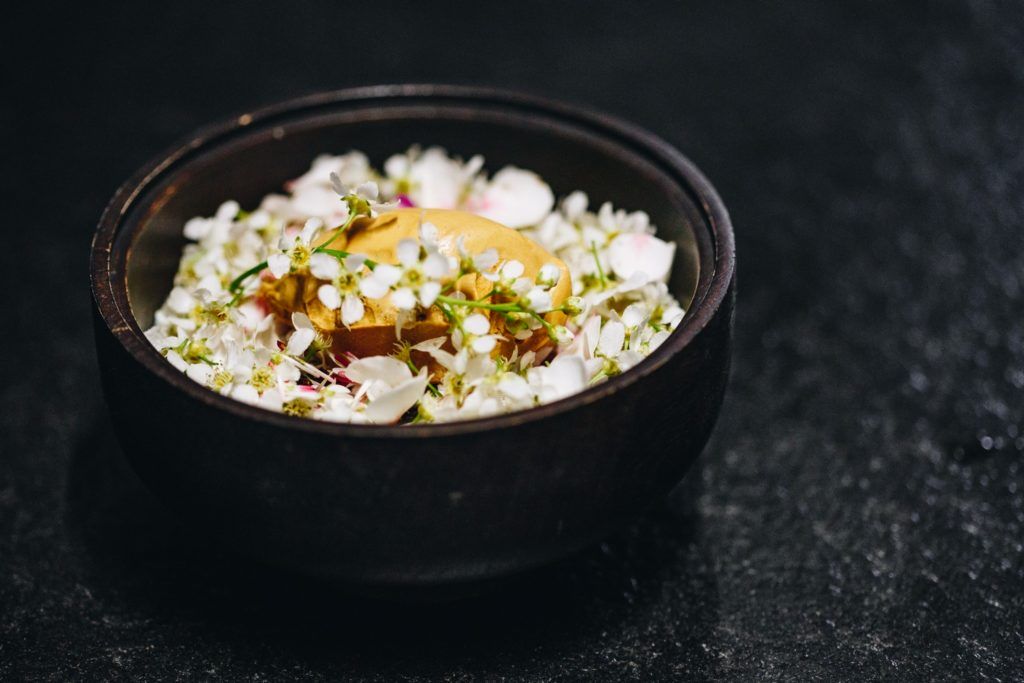
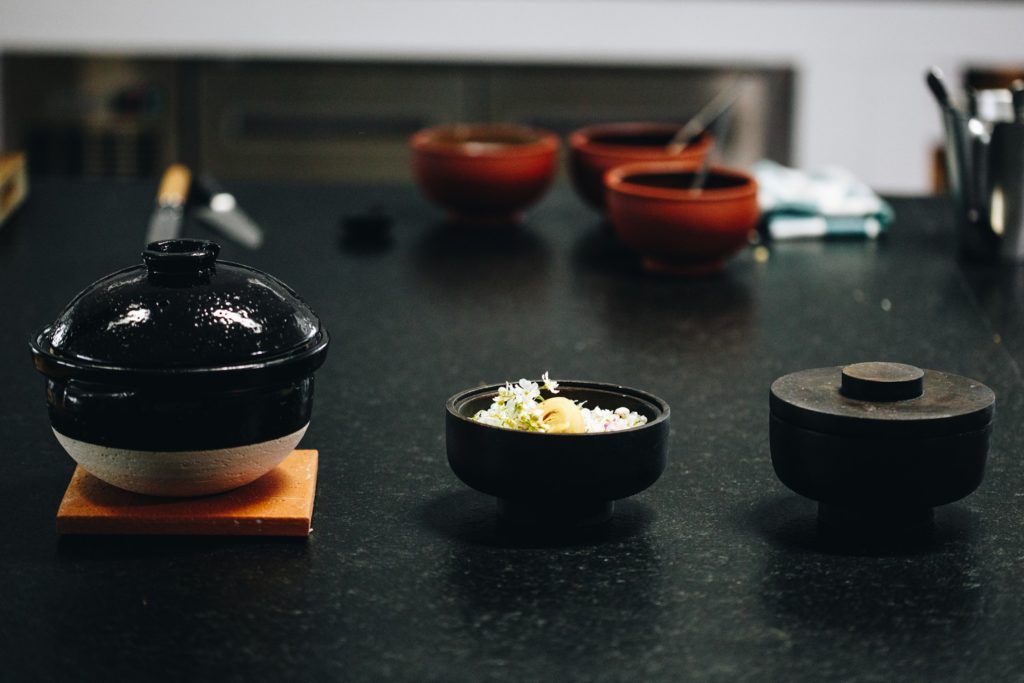
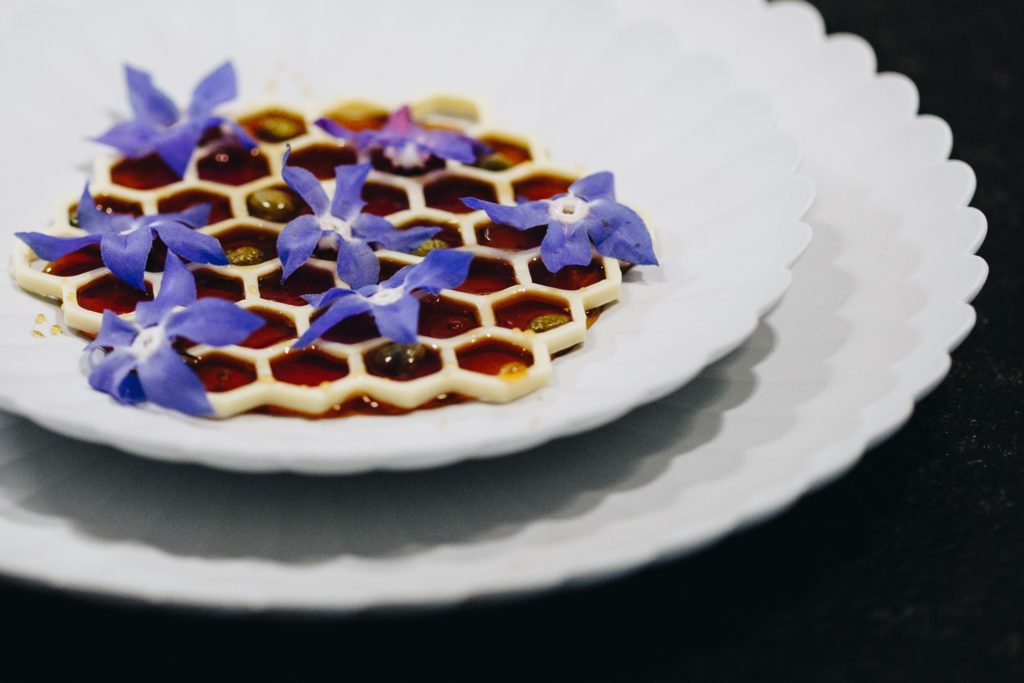
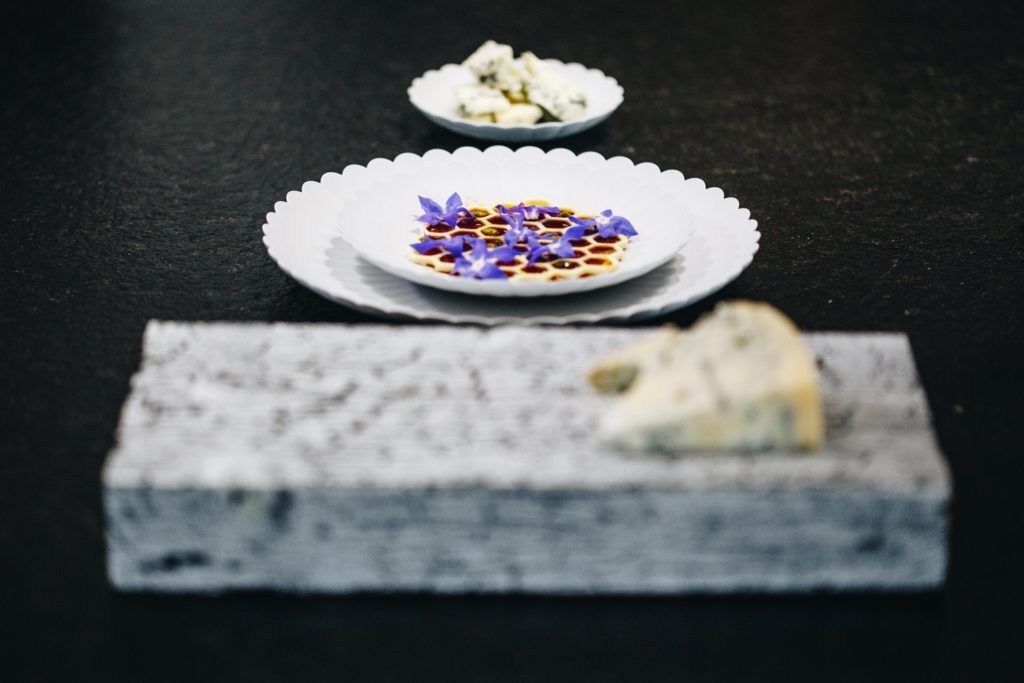
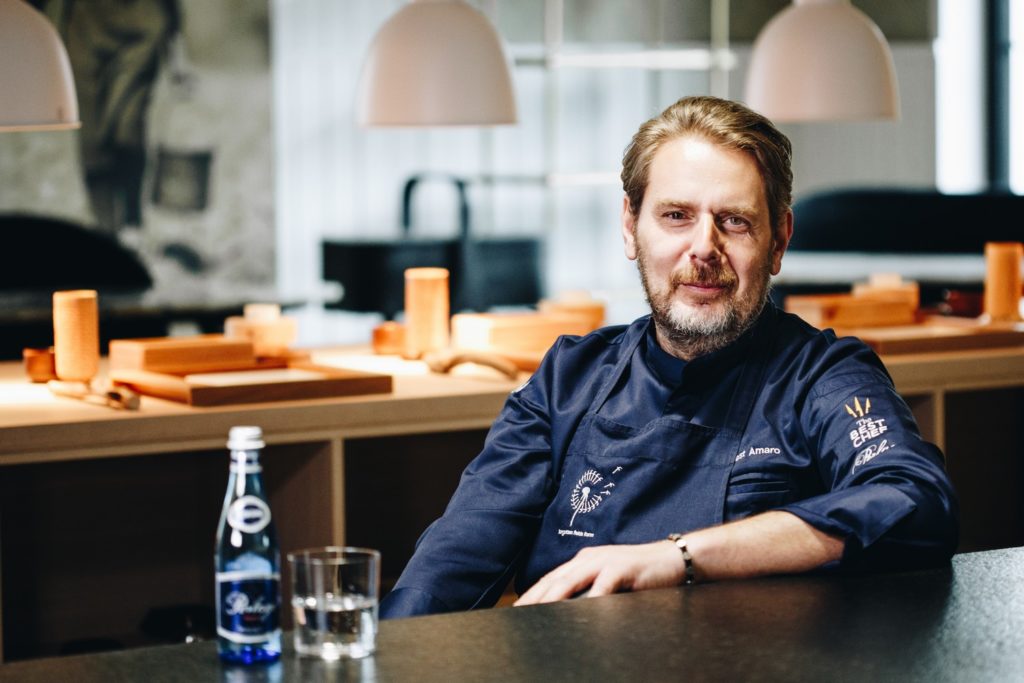
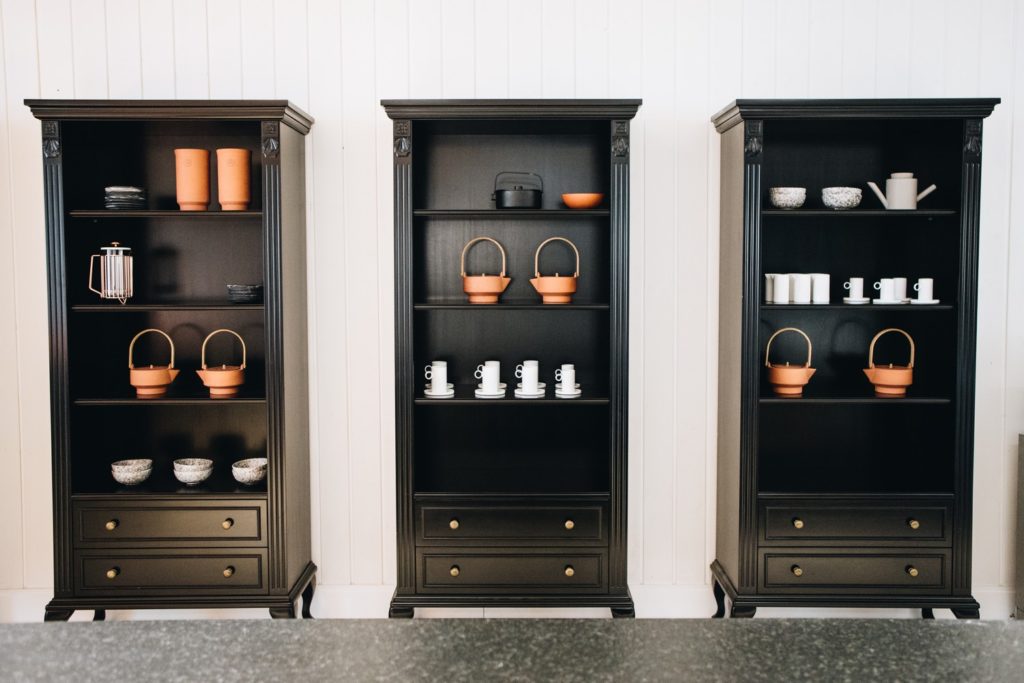
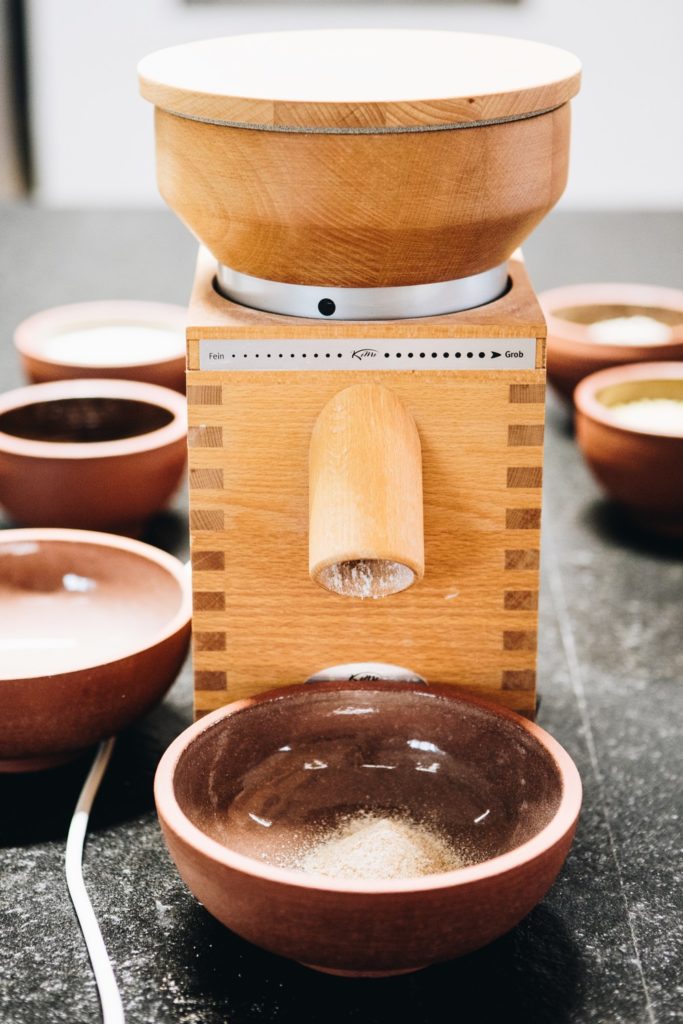
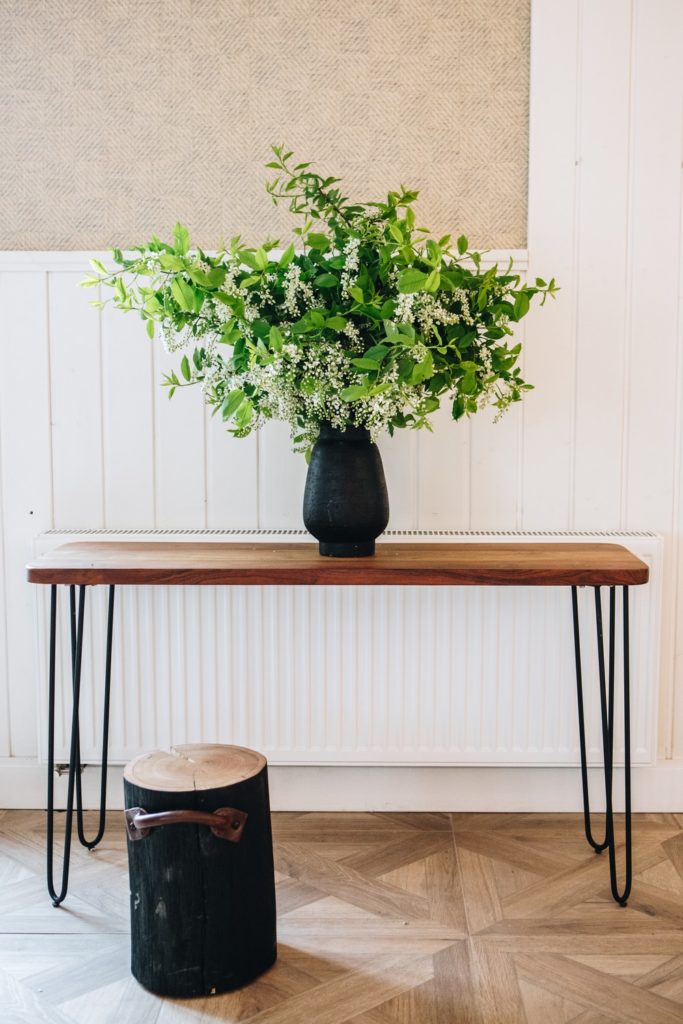

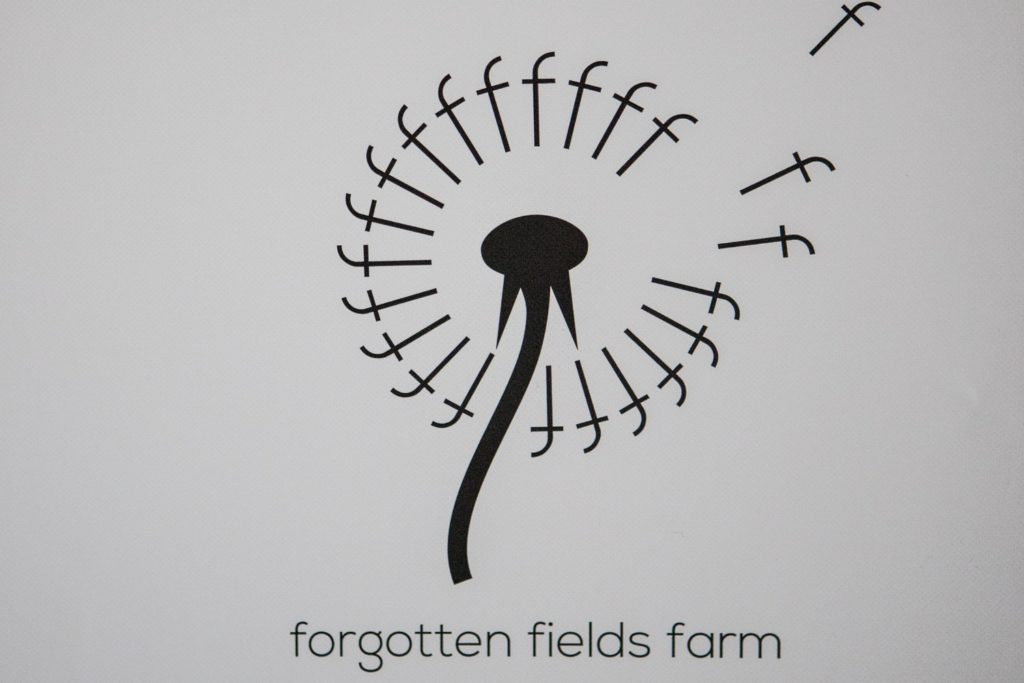
The Best Chef: Could you tell us something more about Forgotten Fields Farm and Nowe Życie Polska Foundation?
Wojciech Modest Amaro: In the area of the Farm here, two initiatives overlap, one is the purely culinary one that I have just mentioned regarding biodiversity, and the other one is the one that also results from my sensitivity to what is happening in the world, especially in Poland, because this is where I work the most. Supposedly in times of general availability of everything, we can say from a culinary point of view that young people do not have an appetite for life. Their stagnation, their style of suspension, certain aversion, complete apathy, actually life passes them by, they no longer have the strength and will, and they have not done anything yet and have not tried.
I have founded the Nowe Życie Polska Foundation, where we will have such a mission, to put them on their feet, to ignite their appetite for life, so I would say it, and here is where it works, this kitchen has its specific size, not only for the needs of the global high-end gastronomy, but also educational, stimulating, inflaming, putting young people on their feet through work, also through prayer, I am a believer, through education, through the gleam in the eye, which we want to appear among these young people. “We help to grow”, this is the Foundation’s slogan, we do not promise the stars, we do not promise cars, houses in one year and living in luxury, swimming in abundance. We want to help make this “special something” appear, the will to develop in their lives.
